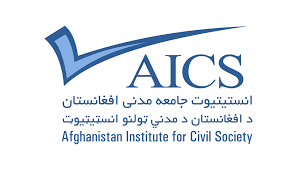The government of Afghanistan is working hard to establish political and economic stability and to build a better, brighter future for its citizens. This challenging task is not something it can achieve alone.
Afghan non-governmental organizations (NGOs) and civil society organizations (CSOs),both local and national, have an important role to play in supporting the government’s efforts. These entities are helping to bridge the gap between the Afghan population and the state. This is particularly the case when it comes to matters like the delivery of priority programs,the creation of better governance structures, and advocacy for vulnerable and under served groups.
However, CSOs in Afghanistan also face a number of hurdles, notably financial and capacity gaps and a frequent lack of public trust. It was to help address these challenges that the Afghanistan Institute for Civil Society (AICS) was established in 2015.
The goal of AICS is to contribute to a stronger, more robust civil society in Afghanistan.It accomplishes this goal by raising the credibility of the civil society sector (including domestic NGOs and CSOs), engaging in dialogue and advocacy around civil society policy, and strengthening philanthropic efforts.
Read on to learn more about this important organization.
1. The launch of AICS is the result of nearly a decade of planning.

Although AICS was not officially established until 2015, the seeds of the organization were planted nearly a decade earlier. In 2007, through the efforts of a number of entities—including the government of Afghanistan, the Aga Khan Development Network, the World Bank, the United Nations Development Program, and the Asia Development Bank—an Enabling Environment conference was held in Kabul.
The impetus behind the conference was to identify practical measures by which Afghanistan could create an environment that would facilitate progress and development. As a result, the country could move from a climate of fragility to one of confidence in a strong future.
One of the most important recommendations to emerge from the conference was the creation of an independent body to review and provide certification for CSOs. Such an entity would improve their recognition by government agencies, the private sector, and donor organizations.
The conference recognized the importance of CSOs to the successful development of Afghanistan. However, it was acknowledged that many CSOs, due to the challenges mentioned above, fell short of achieving their full potential. Thus, after extensive consultations with relevant stakeholders, AICS was launched in February of 2015.
2. NGO certification is AICS’ flagship program.
Given its mandate to support a credible and competent civil society sector in Afghanistan, AICS focuses most of its efforts on its flagship certification program for CSOs. The certification program involves assessing and evaluating Afghan CSOs against a number of key standards.
Entities are evaluated on key areas like internal governance, strategic management, program delivery, and financial management. Additionally, these standards are locally defined and internationally recognized.
In total, there are 66 standards involved in certification. CSOs are certified by AICS after a comprehensive process which includes an eligibility test, a desk review, and a field assessment visit. As of August 2018, 34 Afghan CSOs have earned AICS certification.
3. There are many benefits to becoming an AICS-certified NGO.
By participating in the AICS certification process, entities demonstrate that their policies and activities are aligned with international best practices. Certification also means local NGOs and CSOs enjoy many valuable benefits. These include: better organizational capacity and performance; additional influence in policy dialogues due to improved credibility; opportunities to build long-term funding relationships with private sector partners and international donors; and greater trust among their constituencies as a result of improved accountability and transparency.
In addition, CSOs that are certified by AICS have the opportunity to join the certified CSOs Working Group. This group works to increase the effectiveness of individual CSOs and to improve the civil society sector as a whole by providing opportunities for members to connect with each other and share knowledge and experiences. Members of the Working Group meet once every quarter for mutual support and exchange.
4. AICS is one of the driving forces behind National Civil Society Week.
In addition to its CSO certification work, AICS organizes other activities and events that aim to strengthen Afghanistan’s civil society sector. One of the most important recent initiatives spearheaded by AICS was National Civil Society Week. This event was celebrated in Herat province in late June, 2018.
National Civil Society Week was an unprecedented gathering of more than 150 CSOs, individual activists, government and private sector representatives, media members, and academics from across Afghanistan. The aim of the event was, in many ways, to continue the conversation begun in 2007 at the Enabling Environment conference.
That is, it was intended to provide an open space for participants to reflect on, learn about, and collaborate on issues relating to the development of a robust civil society sector in Afghanistan. Specific events that took place as part of National Civil Society Week included panel discussions, presentations from international speakers, a celebration of CSO success stories, an educational theater production, and an award ceremony for newly-AICS-certified CSOs.

